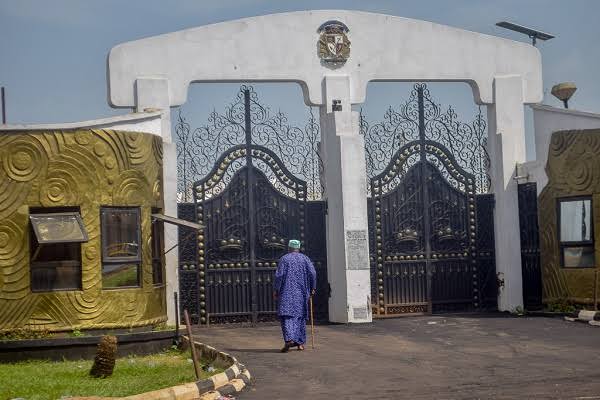News
Awujale Stool Open Only To Direct Offspring of Awujale Fusengbuwa – Olufadi Royal Family Sets Record Straight

Those who do not belong to the family are totally excluded. The General Secretary of the Fusengbuwa Ruling House, Prince Adeleke Adeyemi confirmed…
The passing of Oba Sikiru Kayode Adetona in July 2025, after an extraordinary 65-year reign, has set in motion the process of selecting the next Awujale of Ijebuland. According to tradition and law, the responsibility now falls on the Fusengbuwa Ruling House.
The Awujale stool is a hereditary throne and will usually revolve or rotate among persons from the same or common ancestor – in this case, Awujale Fusengbuwa. Those who do not belong to the family are totally excluded. The General Secretary of the Fusengbuwa Ruling House, Prince Adeleke Adeyemi confirmed that “outsiders with no direct blood ties to Fusengbuwa are not eligible to contest for the stool.”
In particular, the Chiefs Law of 1959 named the ruling house Fusengbuwa Ruling House after Awujale Fusengbuwa to make it explicit that only direct descendants of Fusengbuwa are entitled to vie for the vacant Awujale throne. The Chiefs Law of 1959 further states that candidates for the Awujale vacancy must (a) be members of the Fusengbuwa Ruling House, and (b) come from the male line of descent. If no qualified male descendant is available, female-line descendants may be considered. This provision protects the throne’s integrity and ensures its continuity through legitimate bloodlines.
This rotation of the stool between distinct male lines of the same ruling house is not new. Anikilaya Ruling House produced two Awujales from two different male lines: Awujale Adeleke Ogbagba (1896–1906), and Awujale Ademolu Fesogbade (1916–1925). Also, the Fidipote Ruling House followed the same pattern: Awujale Adeona (1906–1915), and Awujale Ogunnaike (1929–1933). This precedent strongly supports the claims of the male line descendants of Awujale Fusengbuwa.
It’s common knowledge that the Fusengbuwa Ruling House has eight distinct units. Among them, these two male lines have the primary right to present candidates: Olufadi line – from Olufadekemi, Fusengbuwa’s first Abidagba (meaning child born to a reigning monarch), and Tunwase line – from Fusengbuwa’s younger son, Ali Adesimbo. The other units may only present candidates if there are no qualified candidates from the Olufadi or Tunwase’s lines.

According to Prince Adeleke, “the royal family is large and extensive and we are all one and continue to welcome all distant relations of the ruling house.” Emphatically, Prince Adeleke underscored that the “primary right to the stool is restricted to the male line descendants and the secondary right to the stool is restricted to the female line descendants.”
Traditionally, the first male Abidagba, Olufadi, held seniority within the ruling house. However, when the stool became vacant in 1886, Olufadi had passed away, leaving Tunwase as the only qualified candidate. Tunwase became the 45th Awujale (1886–1895). The Tunwase line also later produced Awujale Oba Theophilus Adenuga Tunwase, the 50th Awujale, in 1925. His reign ended in controversy when he was deposed and exiled to Ilorin in 1929.
Recommended News:
- Awujale: Fusengbuwa Ruling House Declares Members of Screening Committee
- Land Grabbing: IGP Arraigns Three Over Alleged Forgery, Illegal Occupation In Lagos
- Tinubu’s Re-election in 2027 Unstoppable – APC Chieftain Aliyu
Simultaneously following Tunwase’s outcast, Oduwole Obanlefa Olufadi, a direct descendant of Olufadi, was put forward by the Fusengbuwa Ruling House as rightful successor. On February 15, 1929, he petitioned the colonial administrator, Resident P. A. Talbot, asserting the Olufadi family’s rightful claim to the throne. Though the appeal held undeniable merit, colonial authorities were persuaded by the Fidipote Ruling House’s counter-arguments which asserted the Fusengbuwa house had already taken its turn.
As a result, Oduwole Obanlefa Olufadi’s legitimate claim was rejected, again depriving the Olufadi male line of their hereditary status. While his petition was rejected, it preserved the family’s claim for future generations. Despite being denied their rightful turn for over a century, many direct descendants of Awujale Fusengbuwa have remained deeply committed to public service and the preservation of Ijebu traditions. For example, Prince Fasasi Adebisi Obanlefa Adeyemi, a fourth-generation descendant of Olufadi male line, served as Olori-Ebi (head) of the ruling house for 25 years (1988–2013).

The upcoming selection is more than a royal matter; it is about upholding Ijebu heritage. Prince Adeleke was happy to share the enthusiasm by many members of the Ruling House and emphasized that the ultimate goal is unity and oneness of all family members. He also made mention the family’s appreciation of Prince Adedapo Oluseun Abiodun, MFR, governor of Ogun State, the newly constituted Administrative Body of Ijebu-Ode, the Kingmakers and key administrators of Ogun State. He asserted that the Fusengbuwa Ruling House, pledge to serve diligently, transparently, and with the utmost deference to this sacred institution.
Together, with unity of purpose and respect for tradition, we believe that we will honour the legacy of our ancestors and preserve the cultural heritage of the Ijebu people for generations to come.






















Pingback: Irete Gears Up for Onirete’s 4th Coronation Anniversary, Gov. Abiodun, Ijebu Monarchs, Dignitaries to Attend Grand Celebration - Eaglesforesight